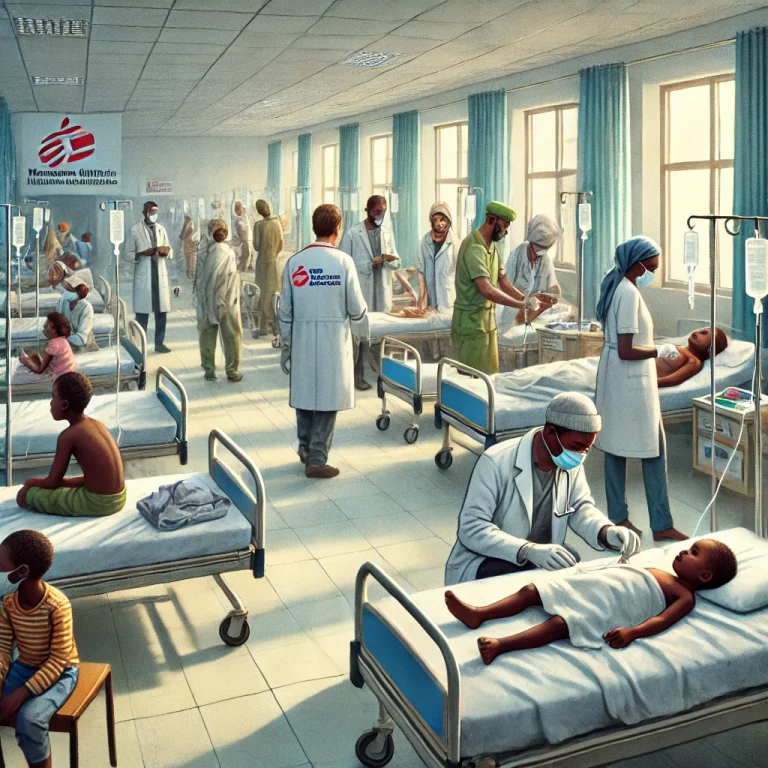Dr. Tope Osundara, the President of the Nigerian Association of Resident Doctors, has raised concerns about how former President Muhammadu Buhari’s death in a UK hospital affects public trust in Nigerian hospitals. He said this shows people are losing faith in the country’s healthcare system.
Buhari died on Sunday in a hospital in the United Kingdom. His former spokesperson, Mallam Garba Shehu, confirmed the news.
His death comes years after his government was criticized for sending top officials abroad for medical care, while hospitals in Nigeria lacked proper funding and equipment.
Speaking to *Reporters*, Dr. Osundara said it was worrying that Buhari still went abroad for treatment, even after spending billions of naira on healthcare during his time as president. He said this sends a bad message about how little trust leaders have in Nigeria’s hospitals.
He added, “First of all, may former President Muhammadu Buhari rest in peace. We, at the Nigerian Association of Resident Doctors, send our condolences.”
He continued, “But the fact that he died in a UK hospital shows that trust in our hospitals is getting worse. It’s already low, and this just makes things worse. Other important people may now also avoid our hospitals.”
Dr. Osundara said it was sad that many Nigerian hospitals were built using public funds, but government officials don’t use them. This makes the hospitals look unreliable and not worth investing in.
“These hospitals were paid for with Nigerian money. If our leaders, past or present, don’t use them, it sends the wrong message. It also discourages others from investing in them. Government spending is already too low, and even when money is given, it only helps if important people use the hospitals,” he said.
He explained that if top politicians used Nigerian hospitals, it would build trust and attract more funding, including partnerships with private companies.
He added, “If people saw the president or former president using our hospitals, investors would feel more confident. They might bring in better equipment and technology. But when our own leaders don’t trust the system, how can we expect outsiders to?”
Dr. Osundara also said many hospitals in Nigeria are in bad shape, with old buildings and outdated equipment.
He said this discourages doctors, especially those still in training, who often feel their only option is to leave the country to find better work and career opportunities.
“Our hospitals have machines that are outdated and no longer used in other countries. These are what we’re expected to work with. It’s very discouraging, especially for young doctors. The system is not helping us, and many professionals feel hopeless,” he said.
He said it is wasteful and harmful to the economy when Nigerian leaders go abroad for medical treatment.
“When they go abroad, they spend money on services there. That money could have been used to improve our hospitals and pay our health workers well. Instead, we are giving our money to foreign countries while our own system suffers,” he said.
He said fixing this problem needs real action, not just words. He urged President Bola Ahmed Tinubu to invest in healthcare and make sure Nigerian leaders use local hospitals.
“The president must fund our hospitals properly and work with lawmakers to focus on the health sector. Every time a leader goes abroad for treatment, it weakens our own system. We must stop that,” he said.
While offering his condolences again to Buhari’s family, Dr. Osundara said the former president’s death should be a lesson for the government to finally fix the country’s struggling healthcare system.
Buhari, who was 82, had been a military ruler of Nigeria between 1984 and 1985.
In 1994, he became head of the Petroleum Trust Fund under General Sani Abacha, where he helped carry out major infrastructure projects across the country.
He ran for president three times—in 2003, 2007, and 2011—but lost each time. He finally won in 2015 under the All Progressives Congress (APC), defeating the sitting president, Goodluck Jonathan.
He was re-elected in 2019 and served until 2023.
Buhari’s win in 2015 was historic because it was the first time a sitting Nigerian president lost an election to an opposition candidate.
During his time in service, he received many honors, including Grand Commander of the Federal Republic and other military awards like the Defence Service Medal and the Forces Service Star.
He also held international awards like the Global Seal of Integrity and the Congo Medal.


